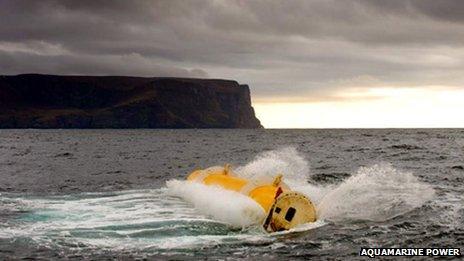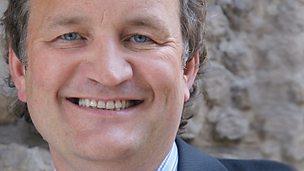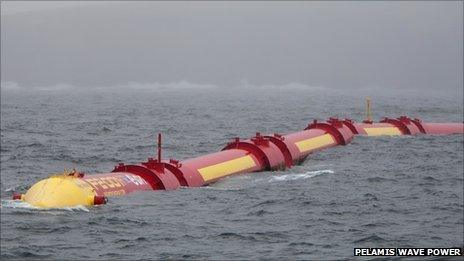Commercial wave power hope in Scotland 'requires patience'
- Published

Aquamarine Power is trying to see the Oyster wave power device through to commercialisation
Engineers can do some very clever stuff, but they are still struggling to harness one of the most common sources of energy in the world.
Waves can carry quite a punch. In the Mediterranean, they might have 5kW. Off the coast of Orkney, the average wave is around five times as powerful.
But in a storm, a wave can be hundreds of times more powerful. It carries a far denser energy than wind. And it does so in corrosive salt water.
It's a stressful environment. Putting your wave power device in harm's way carries a reasonably high chance of having it torn apart by the very waves it's trying to exploit.
And by no coincidence, the same is true of the financial risk involved. The chief executive of one of the two big hopes for wave power based in Edinburgh leaves little doubt that he faces a significant struggle to find the financial backers with the patience to see his company's Oyster wave power device through to commercialisation.
It's taking a lot longer than planned when Aquamarine Power was set up in 2005, developing a design that had come out of Queen's University, Belfast. Edinburgh and Strathclyde universities are also applying their brainpower to the challenge.
Martin McAdam joined Aquamarine five years ago. Last year, it reported a loss of £35m.
It's a great opportunity. There's enough wave power to provide five times the world's electricity demands, but no-one's doing it at a commercial scale yet.
"The challenge is huge," says the company boss. It attracts young eager engineers to work at the frontiers. He's currently recruiting eight more.
The Oyster 800 is situated near the shore, near where waves break, all flowing in one direction, capturing the power of waves in its hydraulics as they wash over it, and then transferring that power to a turbine onshore.
'Deeper pockets'
By contrast, the Pelamis device, also being developed in Edinburgh and tested off Orkney, is like a sea-snake, also using hydraulics, but a much larger device, further out to sea, where there's more turbulence and waves come from different directions.
Past experience of the engineering challenge means that recent successes in an Oyster's autumn trial, linked up to the grid, suggest this is not yet time to get carried away. After a summer refit, the basics might work, but the components are not working as they should.
The technical risk is closely aligned to the financial one, and Martin McAdam, a tall, jovial Irishman, says Britain is at risk of another technological lead being lost due to financiers' short termism.

Aquamarine Power CEO Martin McAdam says Britain is at risk of another technological lead being lost
"The investment is more than we anticipated and the time to get to a commercial product is longer than we anticipated," he says.
He has SSE and ABB as investors, along with the investing arm of the Scottish government. So does he need more like them, with deeper pockets?
"Someone once told me there's no point in deep pockets if you have short arms," McAdam replies.
He explains his concerns: "The UK has an unfortunate history of developing really excellent technology. Some of the best wind turbines were invented in the UK, but all the work put in by wind resulted in most of that technology migrating overseas or being sold overseas. The large wind turbines are now imported, principally from Denmark, Germany and the US.
"We have to be patient. The idea that we can always turn round an investment in a couple of years and make it profitable is not something we used to have. It's relatively recent. We need to get back to the idea that long term investments can be profitable, and if managed in the right way, will build a long term sustainable industry in the UK."
State subsidies
The Aquamarine chief executive is also warning that a new threat comes from just across the Channel. At Cherbourg, a consortium of French interests, including state-backed energy companies, have identified space and 137m euros to invest in the sector.
"It's a real risk for us," says McAdam. "The French have made up their minds they're going to do this. They've been watching us carefully for a while, and they're now launching a major programme of catch-up. I think we can stay ahead, but we do need to encourage investors now, in the same way the French have."
The UK also had a lead in nuclear technology, a sector in which Martin McAdam used to work. But it now relies on financing by a Chinese state-controlled enterprise and technology from a French-owned one.

Pelamis Wave Power has been testing its "sea-snake" device off Orkney
While he's not against a new generation of nuclear, he is clearly riled by the subsidies and guarantees it gets; a higher price than wind, a much longer contract, the government handling management of waste disposal, and guarantee to investors should the UK programme be closed down.
Marine power - wave and tidal - has received less than half the amount funnelled to nuclear each year, it is claimed.
And that's while government has delayed decisions which would secure grid connections from the parts of the north and west where wave power is at its best, while delaying its decision on the floor price at which it's willing to guarantee different types of renewable power generation.
Small nation
The recent reverse on green energy commitments from Downing Street have the Aquamarine boss concerned: "What investors need is a long term stable political environment where they see the infrastructure of the girds being put in place and where they see the electricity market is put in place and working for a considerable time - in other words over the time they need to make the investment commitment.
"What politicians have to understand is that when you make a decision, you stick with it, because that means the investors will come and they will stay".
Does that mean the uncertainty over Scotland's constitutional future is a further concern for Aquamarine or its potential investors?
"I absolutely do not see independence as an issue. Scotland as a small nation can and does perform very adequately today in terms of its economic activity, and despite all the scaremongering, I don't see how that would change.
"There's more transparency, there's a lack of bureaucracy, they can move quickly and get decisions made quickly. I would see an independent Scotland to be a great place to invest, just as it is today."
There speaks an Irishman, with no concerns about living in a small nation. And with a lot of frustrations about the larger one.
You can hear part of this interview with Martin McAdam through the free weekly download of the Business Scotland programme on BBC Radio Scotland or on the BBC iPlayer, until 30 November.
- Published16 September 2013
- Published22 May 2013
- Published8 April 2013
- Published4 March 2013